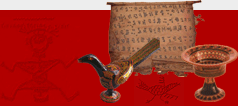|
声像传达:1912年的诺苏社会之旅
Photographs and Sound Recordings: A Short Journey to the
Nuosu in 1912
Wyss, Tamara 塔马拉·魏斯
Freelance & Visual Anthropologist, Germany
德国自由作家、影视人类学者
【摘要】该介绍主要以我的祖父母在1912年的凉山地区之行以及他们所记录的一些照片和一些传统歌曲的录音带为焦点:1)照片:除了带来的这些照片,请允许我说一些关于我祖父母以及这些照片来历的事情;
2)录音带:我的祖父母拍照的时候,他们也借机录一些歌曲。我也能带一张录有这些歌曲的CD来。这些歌曲最初被录在蜡盘上,作为柏林人类学博物馆人类学部门的音乐(他们也是版权所有者);3)家庭录像带:有两次我曾问诺苏人他们对那幅画的印象以及理解——这两群人是曾经在达布(Dabou)和美姑(Meigu)之间的一个社群——我认为哪个地方应该叫做西格,但是我不太确定,你顺着从达布(Dabou)和美姑(Meigu)来的路可以找到它;另外一群则坐落于昭觉地区的一个小村子里。我不太确定这些播放是否还那么有趣,但是如果你们想播放这些录像带的话,我们也许能播放其中的一部分。我对这两次遭遇的翻译都很粗略。
以下是我祖父母简要的生平:
马克思·弗里茨·维斯(Max Friedrich (Fritz) Weiss) 1877-1955
郝威格·玛格丽特·维斯·索尼伯格(Hedwig Margarete Weiss-Sonenburg)1898-1975
福里兹·维斯(Fritz Weiss)在柏林的东方研究会学习法律和中文,1899年他前往中国,在中国的第一年里他在青岛做海关官员。他并不喜欢那份工作并调职到德国外事办公室作为一些德国领事的翻译。在1905年他被调往重庆和成都,他很快就成为那儿的代理领事并于1911年起一直是正式任命的领事。他利用停留在四川的机会遍览了这个省,靠走路还有骑马。比如说,在德国度完一个假期以后他通过陆地穿过印度回到中国。他也许更宁愿自己变成一个地理学家而非一个领事官员。他照相,做草图,绘制地图并给一些地理杂志写文章。
在1909到1910年间的旅行中他开始接触到一些属于彝族的少数民族。这些接触使他产生了有一天能够有机会游览大凉山地区的愿望。在一个回国的假期里他遇到了她未来的妻子:郝威格.玛格丽特.索尼伯格(Hedwig
Margaret Sonnenburg)。她也对遥远的国家很感兴趣并且很喜欢冒险,她来自于一个混合的德国犹太家庭。可能是旅行的共同爱好帮助了他,于是他们俩在1911年的夏天进行了闪电式的结婚并离开德国前往中国。这对夫妇最终于1912年春天到达了成都。
在1913年十一月他们秘密的游览了凉山地区,他们穿过了现今被称为大柏(或叫做哦片亭)和马鞭(马片亭)的地区。在这次简单的旅行中,他们除了照相还用最早的录音装置——一个爱迪生留声机把一些歌曲录到蜡盘上,这个蜡盘属于专门收集全世界声音记录的柏林人类学博物馆。
在这个博物馆和慕尼黑人类学博物馆里也有由福里兹.维斯(Fritz Weiss)先前购买并捐赠的一系列关于彝族人每天生活的手工艺品。1914年维斯夫妇来到了昆明并设立了昆明(云南府)地区的第一个德国领事馆。在1917年他们不得不离开中国,因为中国加入了第一次世界大战中的同盟国,所以所有德国官员都不得不离开中国。他们持续半年的归国旅程同样成为一次冒险旅程。
他们生命中大部分时间都是在旅行中度过。他们感到遗憾的是他们不能再回到中国。福里兹·维斯(Fritz Weiss)在二十年代被任命为驻埃塞俄比亚大使(在那他认识了海乐.塞拉斯Haile
Selassie)和驻一些拉丁美洲国家的大使。在1934年,纳粹党人在德国执政后,他放弃了他的职位。
郝威格·维斯(Hedwig Weiss)从她原来经历的风风雨雨中获得灵感并成为了一个作家,各种杂志期刊中都有她的文章发表,她还写了一些儿童读物,其中有两部还以中国为背景。
This presentation focuses on my grandparents journey
in the Liangshan area in 1912 with some of the photographs
they have taken and sound recordings of traditional songs.
1) Photographs: besides of bringing the pictures, I will
say a few words in regards to my grandparents and how the
pictures came about (as far as it is known). 2) Sound recordings:
My grandparents also did some sound recordings of songs
at the same occasion when taking the photographs, this CD
will be presented at the conference The original was recorded
on to wax reels, for the music ethnographic department of
the Berlin ethnographic museum. (They are also the copyright
owner) 3) VHS: On two occasions I asked some Nuosu people
about their impressions and interpretations regarding the
pictures- once a group between Dabou and Meigu; the other
group was in a little village in the Zhaojue area. I will
play a VHS tape of these encounters also.
Max Friedrich (Fritz) Weiss 1877-1955
Hedwig Margarete Weiss-Sonenburg 1898-1975
Fritz Weiss studied law and Chinese at the Oriental seminar
in Berlin. 1899 he went to China, and worked during his
first year there at the customs office in Qingdao. He didn't
particularly like this work and changed to the German foreign
office and became an interpreter in a number of German Consulates.
1905 he was transferred to Chongqing and Chengdu, soon becoming
acting consul and from 1911 onwards appointed consul. He
used his stay in Sichuan to extensive travels around the
province, mainly on foot and on horse. For example, after
one holiday in Germany he returned to China through India
by land. He would probably have preferred to become a geographer
instead of a consular official. He took photographs, did
sketches, drew maps and wrote for some geographical magazines.
During his journeys 1909 and 1910 he came into contact
with minority people who belonged to the Yi. From this emerged
his wish that one day he might be able to visit the Daliangshan.
During one holiday back home he met his future wife, Hedwig
Margaret Sonnenburg, who was also interested in far away
countries and had an adventurous mind. Like him, she came
from a mixed German Jewish family. The prospect of travels
probably decided in his favour and they got quickly married
and left Germany for China in the summer of 1911. They finally
arrived in Chengdu in spring 1912.
In November 1913 they managed to travel secretly from
the Chinese authorities into the Liangshan. They crossed
the area between the nowadays Dabou (then: O-Pien Ting)
and Mabian (Ma-Pien Ting). During this brief journey besides
of taking some photographs they also recorded songs on to
wax reels on one of the earliest sound recording equipment,
an Edison Phonograph. It belonged to the Berlin Ethnographic
Museum, which collected sound recordings from all over the
world.
This and the Munich Ethnographic Museum also contain
a collection of Yi everyday artefacts which Fritz Weiss
had previously bought and donated.
1914 they moved on to Kunming where Fritz Weiss opened
the first German Consulate in Kunming (Yunnanfu). 1917 they
had to leave China; China had entered the first World War
on the side of the allies and all German officials had to
leave the country.
They journey back to Germany, lasting half a year, again
became an adventure.
Traveling stayed with them for most part of their life.
To their regret, they couldn't return to China. Fritz Weiss
was made ambassador to Ethiopia in the twenties, where he
struck a friendship with Haile Selassie; and later in a
number of Latin American Countries. In 1934, after the Nazis
came to power in Germany, he left his office.
Hedwig Weiss felt inspired by the many things she had
experienced and worked as a writer, published articles in
magazines and wrote children books. Two of them are set
in China.
Keywords:
作者简介:
我是一个人类学方向的电影制作者、摄影师和讲师,从1970年到1974年我在柏林的"Deutsche
Film- u. Fernsehakademie"学院学习,并于1996年获得牛津大学布鲁克斯文化研究文学硕士学位。从1980到1982年我成立并致力于一个佛得角共和国的农村媒体工程;并且在英国接受了各种各样的成人教育,旨在研究像爱尔兰Tinkers
之类的少数民族。我的工作是做为柏林电影学校、英国的大学和继续教育学院的一个演讲者。我只做了大量的电影,两个摄影展,并与一些非政府组织合作。
About the author:
I am an anthropological orientated film maker, photographer
and lecturer. Studied at the "Deutsche Film- u. Fernsehakademie"
in Berlin 1970-74, MA from Oxford Brookes in Cultural Studies
1996. Set up and worked in a rural media project in the
Republic of Cape-Verde 1980-82; various other adult education
projects mainly in Great Britain; some geared especially
towards minorities as Irish Tinkers. Worked as a lecturer
at the Filmschool in Berlin and at Universities in Britain
and Colleges of Further Education. Made a number of own
films; two one woman photography exhibitions, collaboration
with a number of NGOs.
|





